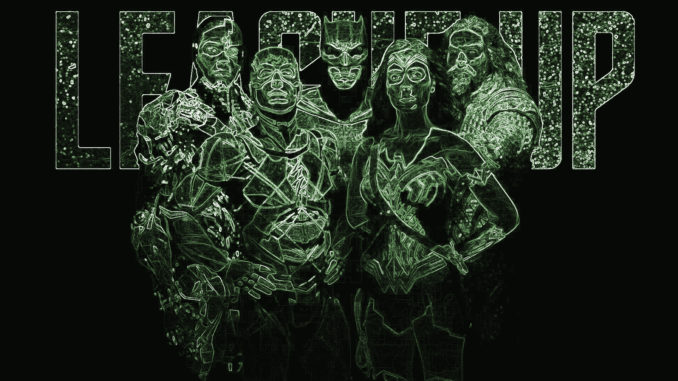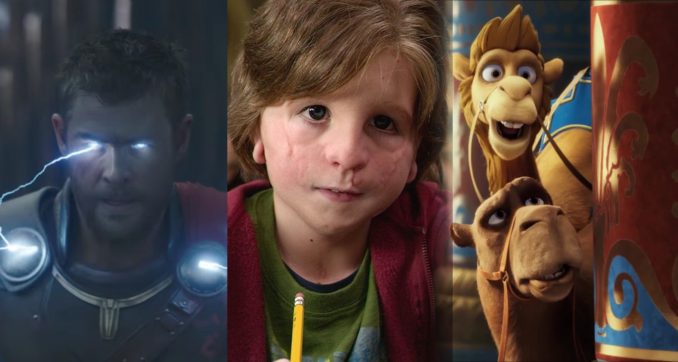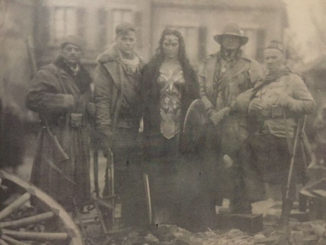 By now, every film fan must have heard about Justice League‘s horrible, totally awful, no good, rotten weekend by now. Certain you have seen one or two (or fifty) articles about how disappointing the film’s $96…er…hold on…sorry, $94 million opening weekend was, especially when it was projected to open at $105-$115 million just days before.
By now, every film fan must have heard about Justice League‘s horrible, totally awful, no good, rotten weekend by now. Certain you have seen one or two (or fifty) articles about how disappointing the film’s $96…er…hold on…sorry, $94 million opening weekend was, especially when it was projected to open at $105-$115 million just days before.
They say that success has many fathers but failure is an orphan, Well, I’m going to look for this failure’s parents. What caused it the underperform and why? And like Hercule Poirot in Murder on the Orient Express, I’m going to gather up the suspects and list their motives. But don’t worry. I’ve not come to bury Justice League. I actually liked it. I’m just trying to give some form to your arguments.
Rotten Tomatoes
 Or, rather, the critics and their bad reviews. Unlike Brett Ratner, I could tell the difference between the two.
Or, rather, the critics and their bad reviews. Unlike Brett Ratner, I could tell the difference between the two.
Yes, Ratner famously blamed the review aggregator for hampering the performance of Batman v. Superman: Dawn of Justice by letting fans know that the film had received bad reviews. And you’d think have something to say about the way the site handled Justice League, if he wasn’t otherwise busy (see below).
The site gave the film a 40% fresh rating as of press time. That is not high enough to get a “fresh,” or recommended branding. It is, however, higher than either BvS and Suicide Squad. If fans truly followed the site, it would know that the film was an improvement over those two films, which they came out to see in droves. However, if you weren’t familiar with that history, that fresh rating might have been enough to have people stay away on its own.
Brett Ratner
 Did I mention Brett Ratner? Yes, I did.
Did I mention Brett Ratner? Yes, I did.
Ratner’s Ratpac Entertainment was one of the production companies that helped make Justice League. Ratner is also one of the Hollywood players caught up in the sexual harassment scandal. Multiple women have accused him of crimes ranging from rape to groping, and he is one of the few celebrities who decided to fight back via his lawyer with a dose of victim shaming.
His actions have already caused Gal Gadot to refuse to return as Wonder Woman if he was attached to produce the sequel. It’s not hard to imagine a few people stayed away from Justice League because they knew he was involved.
Zack Snyder
 There are few Hollywood directors who causes division amongst film buffs. Some of his defenders think he is a visionary with a unique voice and distinct style all his own. Detractors think he is a director with an inflated sense of importance in his work whose films use tricks and excessive slow motion to cover up a lack of substance.
There are few Hollywood directors who causes division amongst film buffs. Some of his defenders think he is a visionary with a unique voice and distinct style all his own. Detractors think he is a director with an inflated sense of importance in his work whose films use tricks and excessive slow motion to cover up a lack of substance.
A good deal of the articles leading up to the film’s released focused on trying to determine exactly how much of the final product was his and how much was reshoots written and directed by Joss Whedon. It was like the media knew that its audiences wanted to know how much influence Snyder had on the production so they could decide whether to see it or stay away.
When it came out that Snyder’s work made up most of the movie, it became a case of “fool me once, shame on you, fool me twice, shame on me.” Snyder haters had already seen the path of diminishing returns Snyder travelled on from Man of Steel to BvS. That was all they need to know to expect his involvement in Justice League would make it a film to avoid. Even though Snyder changed his trademark gloom and doom style for a lighter touch for this film, this subsection of fans weren’t willing to trust Snyder enough to give the film a chance.
Joss Whedon

However, there might have people who stayed away because Joss Whedon took over directing the film. Whedon was touched by the hand of controversy in August when his ex-wife Kai Cole penned a vindictive blog post for The Wrap. In it, Cole called Whedon a hypocrite who talked a good game about being a feminist all the while engaging in numerous physical and emotional affairs behind her back all through their marriage.
The story caused shockwaves throughout Whedon fandom. Whedonesque, the largest online celebration of Whedon’s work, announced soon after Cole’s blog post hit that it would go dormant, and it was hinted that her essay was part of the reason why it ended. Industry blogs commenting on the matter wondered if the scandal would hurt Justice League. Maybe it did.
Ben Affleck
 We can also add Ben Affleck to the list of people attached to the recent spate of sexual harassment cases. Harvey Weinstein gave him and Matt Damon their big breaks by producing their Good Will Hunting script and he himself has been accused of groping Hilarie Burton during a spot on MTV’s TRL program back in 2003.
We can also add Ben Affleck to the list of people attached to the recent spate of sexual harassment cases. Harvey Weinstein gave him and Matt Damon their big breaks by producing their Good Will Hunting script and he himself has been accused of groping Hilarie Burton during a spot on MTV’s TRL program back in 2003.
This has come up repeatedly during the press tours for the movie, and made for some awkward moment for Affleck in interview with the Today Show and Late Show with Stephen Colbert.
If you are one who are of the believe that sexual harassers should be punished by not receiving your hard earned money, skipping Justice League would be a good way to put that policy into practice.
The Reshoots
 Then there is the issue of the reshoots themselves. There is a stigma attached to any film that needs to go back and reshoot footage. It gives the impression that the original film was such a mess that the studio panicked and tried to fix it the best they can by shooting new scenes to make it better.
Then there is the issue of the reshoots themselves. There is a stigma attached to any film that needs to go back and reshoot footage. It gives the impression that the original film was such a mess that the studio panicked and tried to fix it the best they can by shooting new scenes to make it better.
This is no longer exclusively the case. Reshoots are no longer the result of bad movies or result in bad movies. Rogue One: A Star Wars Story under went reshoots and came out of them a stronger film.
However, the preconceived notion that reshoots are a sign of failure is hard to shake. Add to that the length of the reshoots on Justice League, you have something that screams to certain members of the viewing public “DANGER: STAY AWAY!”
The Competition
 Typically, comic book films are released with a big enough cushion between itself and other comic book films and they usually have the weekend to themselves. Justice League was denied both these luxuries.
Typically, comic book films are released with a big enough cushion between itself and other comic book films and they usually have the weekend to themselves. Justice League was denied both these luxuries.
The film was released just two weeks after Marvel’s fall offering, Thor: Ragnarok. Pundits say that Justice League cut into Thor: Ragnarok‘s earnings more that the other way around, but I’m sure being released so close to another superhero film–one that got much better reviews–didn’t help.
Justice League also opened with two other films in wide release: Wonder, and adaptation of a New York Times #1 novel, and The Star, a Christian-themed, Christmas tie-in aimed at kids. Both performed above expectation and both serve demographics that cross over with Justice League. Justice League most definitely would have earned more if it had the weekend to itself.
Warner’s Unrealistic Expectations
 One of the things I focus on here is Hollywood’s pursuit of the $1 billion film. I’ve wrote about it before and I’ll probably write about it again. The reason why I am so fascinated by it is the fact that so many studios strive to reach that plateau but put little or no effort into reaching it.
One of the things I focus on here is Hollywood’s pursuit of the $1 billion film. I’ve wrote about it before and I’ll probably write about it again. The reason why I am so fascinated by it is the fact that so many studios strive to reach that plateau but put little or no effort into reaching it.
Justice League‘s $94 million domestic opening throws any hopes of a $1 billion gross out the window. But that doesn’t mean other studios would love to have that kind or opening. That gross puts the film at the eighth highest grossing weekend of the year. Yes, out of 47 weekends so far this year, it ranks eighth. Not too shabby.
But will it be successful? With foreign grosses, it has already earned $273 million dollars. With a budget between $300 million and $400 million, that means it has either almost made its budget back or has gotten at least half of it. The Thanksgiving holiday is upon us, with a lot of potential moviegoers off from work and school. It does feature competition from Pixar’s Coco, but with a B+ Cinemascore (only Man of Steel and Wonder Woman were higher) it should have plenty of good word of mouth working for it.
However, it making its money back would have been a whole lot easier if it had a lower budget. Or it didn’t open the same day as two other films. Or open two weeks after another superhero film. Or it had a much better story and script.
But Warners didn’t have to worry about that. $1 billion was a shoo-in. Why bother making an effort?
Lack Of Individual Films For All Of The Characters
 The second superhero film to make over $1 billion was The Avengers. You have to think that Warners saw that and believed that Justice League, and gathering of all their more iconic heroes in one film would be guaranteed to surpass that.
The second superhero film to make over $1 billion was The Avengers. You have to think that Warners saw that and believed that Justice League, and gathering of all their more iconic heroes in one film would be guaranteed to surpass that.
But Marvel earned that $1 billion. The Avengers was a culmination of a four year coordinated plan to present their heroes in the best way possible. Each of the major heroes–Iron Man, Hulk, Thor and Captain America–had their own film by that point. Black Widow and Hawkeye were introduced in showy supporting roles in other films. But other than Black Widow meeting Iron Man and Hawkeye facing Thor, none of the heroes met. But all had plenty of screen time to develop their unique and individual characters. They shared the screen for the first time in The Avengers, which made that film an event.
DC decided against using that blueprint. It didn’t seem like they had a blueprint at all. Superman was introduced first. Then Batman and Wonder Woman are introduced as supporting characters in an ipso facto Superman sequel. Aquaman, Cyborg and Flash are also introduced in squeezed in video snippets. Then Wonder Woman gets her own film, and appears next in Justice League, where we get to meet Aquaman, Cyborg and Flash in earnest. We didn’t get to know each of the characters on their own before they were all thrown together. Unlike Marvel, they didn’t build to anything.
Lack Of An Interesting Villain
 Speaking as a DC Comics fan for over 30 years, I think I can say that nobody, and I mean nobody, was excited that Steppenwolf was going to be the bad guy the Justice League faced in this film. I’d wager my left kidney that there was not one Steppenwolf fan in the entire world that was jumping up and down that their favorite character was getting the live action treatment.
Speaking as a DC Comics fan for over 30 years, I think I can say that nobody, and I mean nobody, was excited that Steppenwolf was going to be the bad guy the Justice League faced in this film. I’d wager my left kidney that there was not one Steppenwolf fan in the entire world that was jumping up and down that their favorite character was getting the live action treatment.
Steppenwolf is a minor character. His main draw is that he is Darkseid’s uncle, but that wasn’t really played up in the film (Rumor has it that the connection was one of the things Whedon took out). Instead, Steppenwolf is a rather generic world beater who’s motivation was to remake Earth into his image. Which, I will remind you, is the same motivation as Enchantress in Suicide Squad.
Granted, the comic book Justice League is not known for their bad guys (Professor Amos Fortune anyone? How about Queen Bee?). But for the opening instalment of the Justice League franchise, they needed to face off against someone with a little more history and charisma than Steppenwolf.
So, which of these suspects killed Justice League? Well, the Hercule Poiot was a dead giveaway. They all killed the film. And maybe, just maybe, the DC Extended Universe as well.





As a filmgoer who is sitting out Justice League, the extremely small sample size of me backs the Zack Snyder theory 97%. (I didn’t realize Ratner was attached as a producer, so zero impact there.)
The remaining 3% goes to a mix of studio expectation, crappy reviews, and Whedon. On the Whedon point, it’s not so much the ex’s letter as it is my lifetime ambivalence to his work.